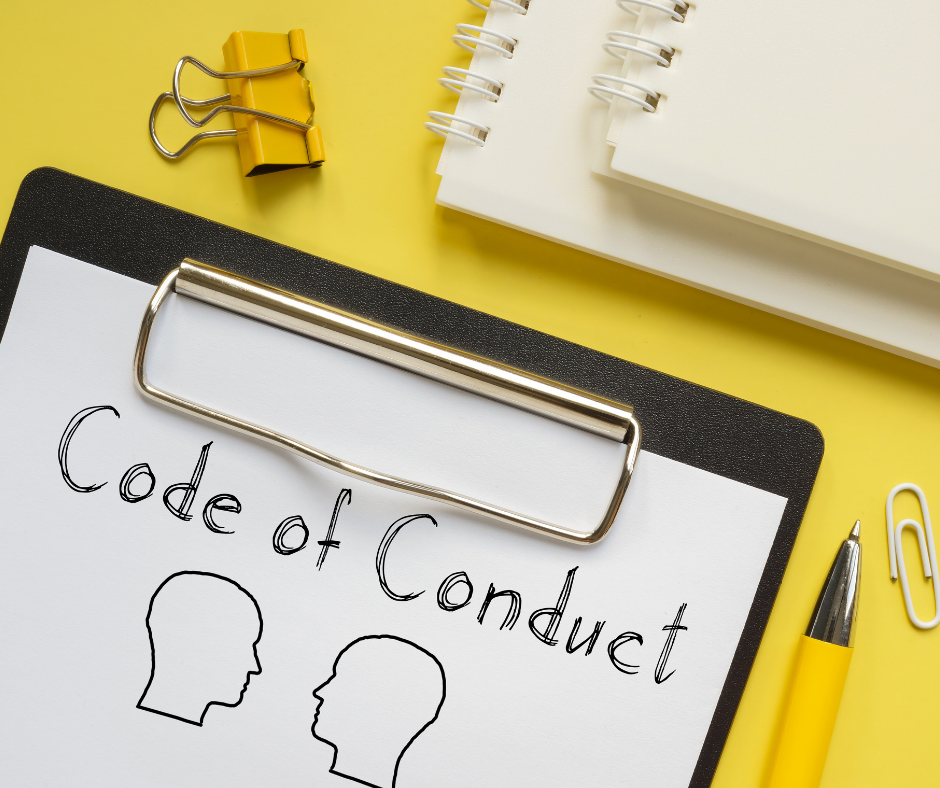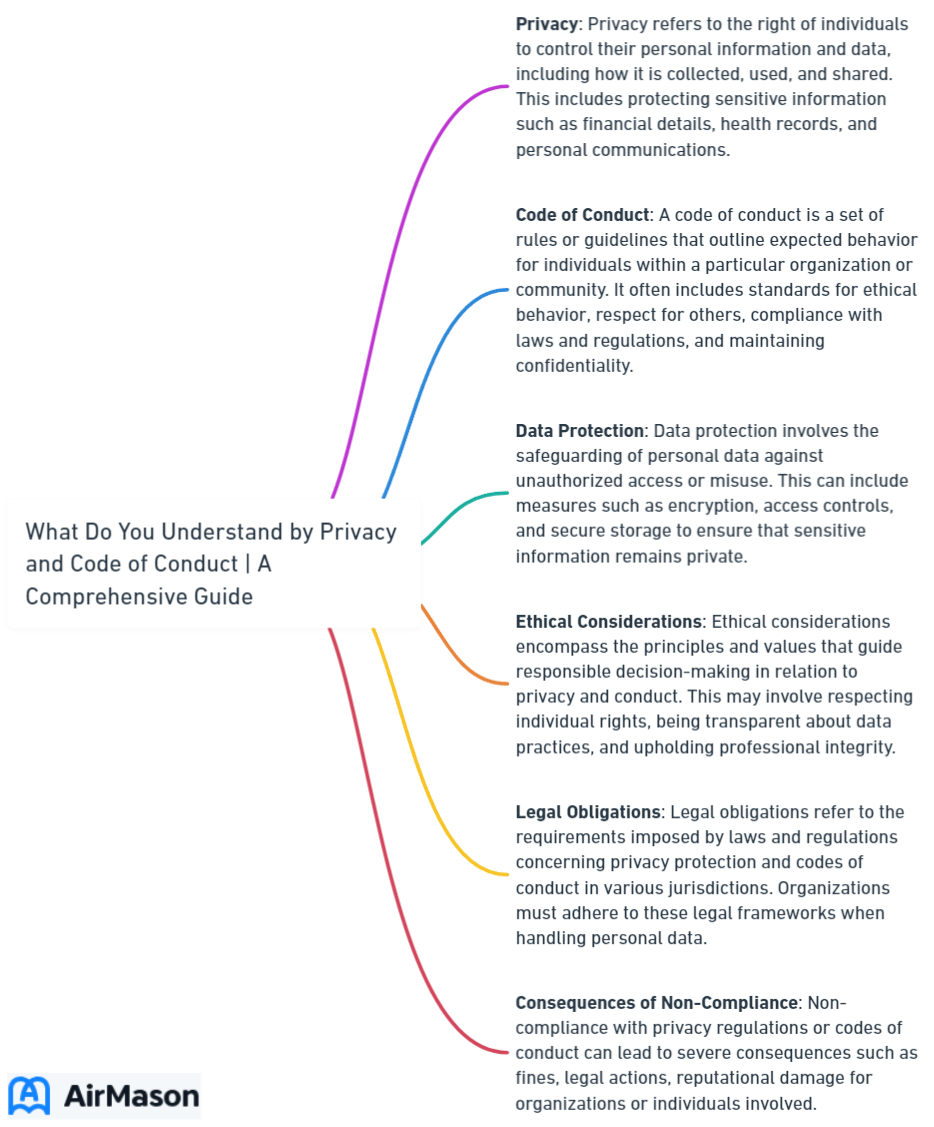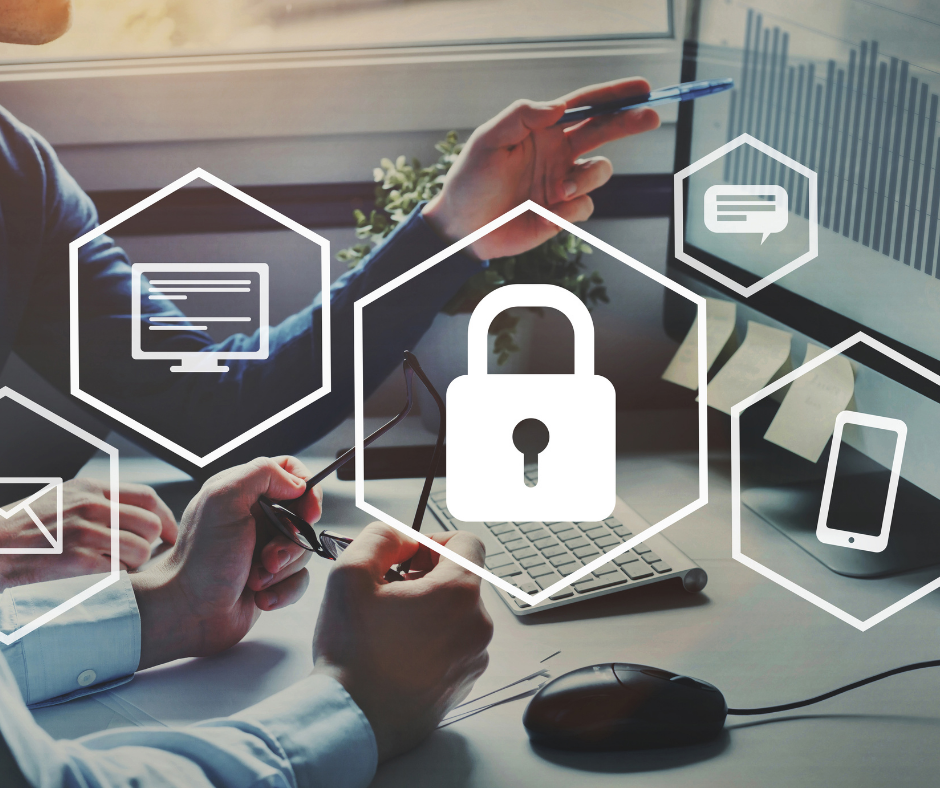
In 2024, the digital landscape is rapidly evolving, and with it, the significance of “what do you understand by privacy and code of conduct” in our personal and professional lives. As individuals and organizations alike grapple with the implications of new technologies and shifting standards, understanding these essential concepts is more crucial than ever. In this comprehensive guide, we’ll explore the relationship between privacy and code of conduct, delve into their practical applications in various sectors, and share best practices to help you navigate the complexities of the modern world.
Key Takeaways
- Understanding and adhering to privacy policies, ethical standards, and codes of conduct is essential for any organization.
- Establish core values, set clear guidelines in a code of conduct, enforce the rules consistently to ensure compliance with regulations.
- Implement best practices such as employee training & education and monitoring & continuous improvement to prioritize privacy & code of conduct.
Defining Privacy and Code of Conduct
Privacy, at its core, is the safeguarding of personal information, which can significantly impact employee behavior. In contrast, a code of conduct is a set of regulations delineating an organization’s behavior and ethical standards, including the proper use of company resources. Both are indispensable for maintaining trust and fostering a culture of ethical behavior in any organization.The importance of privacy and a company’s code of conduct extends beyond the personal sphere and into the business world. Companies must prioritize the preservation of personal data and comply with moral principles and codes of conduct to sustain public trust and avert legal consequences.
We will now examine the relevance of privacy and code of conduct across different contexts such as personal life, the workplace, and the financial sector.

Privacy in Personal Life
Privacy is paramount for personal safety, well-being, and protection against discrimination or harm. In an increasingly digital age, preserving privacy is essential to safeguard personal data from unauthorized access and maintain professional behavior. The risks associated with privacy violation can result in detriment and prejudice, making adherence to a company’s code of conduct all the more crucial.
The importance of privacy extends to various aspects of our lives, including our interactions with others, our online presence, and the way we conduct financial transactions. Grasping the fundamental aspects of privacy and adopting measures like regular account monitoring and confidentiality of passwords and PINs is crucial to ensuring compliance and mitigating potential risks.Privacy in the Business World
In the business world, privacy involves safeguarding sensitive data, upholding customer confidence, and adhering to data protection regulations. Establishing trust with stakeholders, including customers, investors, employees, and partners, is imperative for maintaining the confidentiality of personal data.
Transparent communication is key in fostering privacy and data protection in any business. Companies should:- Make their privacy policy readily available
- Utilize comprehensible language to guarantee customers comprehend it
- Establish strong policies and procedures for managing personal data
These actions bolster customer faith and assurance in the company’s commitment to its business activities.
For businesses, it’s necessary to frequently revise privacy policies to align with the most recent regulations and technological advancements.
Code of Conduct Examples
When considering appropriate behavior within a professional or community setting, it’s essential to examine various code of conduct examples. A well-crafted code of conduct sets clear guidelines for individuals, outlining acceptable behavior and promoting a positive and inclusive environment. For instance, some common elements in code of conduct examples include respect for diverse perspectives, maintaining a harassment-free atmosphere, and encouraging open communication. These codes often emphasize professionalism, teamwork, and integrity, fostering an atmosphere where everyone feels safe, respected, and valued. By studying and implementing effective code of conduct examples, organizations and communities can cultivate a culture of accountability and mutual respect, ultimately enhancing collaboration and overall productivity.
The Interplay Between Privacy and Code of Conduct

Privacy in Employee Records
Employers have an obligation to safeguard confidential information concerning their customers and clients, while also upholding the privacy rights of their employees. Privacy in employee records is essential to maintain the trust between employers and employees, as well as to adhere to privacy regulations. The most effective strategies for safeguarding employee privacy include:- Formulating unambiguous regulations and protocols
- Instructing employees on privacy regulations
- Establishing access control measures
- Encrypting data
- Consistently monitoring and auditing employee data access
By protecting employee records and personal information, organizations can create a culture of trust and ethical behavior.
Ethical Decision Making and Conduct
Ethical decision making and conduct refers to the process of making decisions and taking actions that are consistent with a company’s values and standards. A code of conduct is intended to assist employees in making ethical choices and fostering a culture of honesty and responsibility.Employee conduct, such as exhibiting respect for coworkers and adhering to company policies, is integral to creating a positive work environment and upholding ethical standards. By promoting ethical decision making and conduct, organizations can ensure that their employees act in the best interest of the company, its customers, and its stakeholders. Similarly, the assistance of services like facharbeit schreiben lassen, which helps in crafting academic papers, can be vital for employees who pursue continuing education alongside their professional commitments, ensuring they meet both academic and professional standards efficiently.
Implementing a Code of Conduct in the Workplace

Implementing a code of conduct in the workplace involves establishing core values, setting clear guidelines, and enforcing the rules consistently. A well-implemented code of conduct can create a comfortable working environment, guide employee behavior, and ensure compliance with laws and regulations.
We will now discuss the process of code of conduct implementation in the workplace, emphasizing the significance of affirming core values, defining clear guidelines, and consistently enforcing the code of conduct.Establishing Core Values
Core values in a business context refer to the fundamental beliefs and ideals that guide an organization’s mission, goals, and actions. Examples of core values include:- Integrity
- Respect
- Excellence
- Accountability
- Customer-centricity
Establishing core values is integral to a code of conduct, as they serve as the basis for moral conduct and direct the actions and choices of personnel within an organization. By creating a shared understanding of what is permissible and unacceptable behavior, core values foster a beneficial and inclusive workplace and bolster trust and reliability among stakeholders.
Setting Clear Guidelines
The importance of specificity when establishing guidelines in a code of conduct cannot be overstated. Clear and unambiguous guidelines create a transparent set of expectations for behavior, eliminating any potential for misinterpretation or confusion. This helps to avoid misunderstandings and disputes and fosters a positive and inclusive atmosphere.
Guidelines in a workplace code of conduct should be sufficiently comprehensive to delineate the following:- Behavioral expectations
- Adherence to laws
- Workplace decorum
- Safeguarding of company assets
- Potential disciplinary measures, including the issuance of a verbal or written warning
By setting clear guidelines, organizations can create a culture of compliance and integrity that empowers employees to act ethically and responsibly.
Enforcing the Code of Conduct
The enforcement of the code of conduct is essential for preserving a culture of moral principles and reliability. Consistent enforcement of the code of conduct ensures that all individuals are held accountable for their behavior and demonstrates that the organization takes the code of conduct seriously. Additionally, it fosters a culture of respect and trust, and promotes employees to act in an ethical and responsible manner. Some of the most effective strategies for enforcing a code of conduct in the workplace include:- Clear communication
- Training and education
- Posting explicit guidelines
- Demonstrating ethical behavior
- Incorporating policies
- Engaging employees in the process
- Reinforcing ethical behavior
- Utilizing rewards and recognition
By consistently enforcing the code of conduct, organizations can create a culture of ethics and integrity that benefits both employees and stakeholders.
Business Code of Ethics
A business code of ethics serves as a vital framework that delineates the ethical standards and conduct expected within a business organization. This set of guidelines is designed to govern the behavior of individuals and groups within the business environment, outlining acceptable practices and promoting moral decision-making. The business code of ethics often encompasses a range of principles, such as honesty, integrity, accountability, and responsibility. It establishes a foundation for building trust and fostering positive relationships with stakeholders, including customers, employees, suppliers, and the community. Adhering to a well-defined business code of ethics not only ensures compliance with legal requirements but also cultivates a culture of ethical awareness and responsible business practices.
Privacy and Data Protection in Financial Transactions

Maintaining Privacy in Digital Banking
Digital banking requires robust privacy measures, such as encryption and secure connections, to protect customer information, including credit card details. As more people rely on digital banking for their financial transactions, the need for strong privacy and security measures becomes increasingly important. Financial institutions must be proactive in implementing privacy measures to ensure the confidentiality of customer data. Some key measures include:- Data encryption
- Secure connections
- Regular security audits and assessments
- Employee training on data protection
- Multi-factor authentication
- Strong password policies
- Monitoring and detection systems
Ensuring Security and Compliance in Financial Institutions
Financial institutions must adhere to various regulations, such as FINRA and GDPR, to ensure privacy and security in their operations. These regulations are designed to protect customer information and maintain trust in the financial sector.
To ensure compliance with these regulations, financial institutions must:- Implement policies and procedures that safeguard customer information and records
- Institute effective information-security controls
- Adopt appropriate data protection measures
By adhering to these regulations and best practices, financial institutions can protect customer information, maintain trust, and uphold ethical standards in their operations.
Conducting Business
When entrepreneurs embark on a journey to conduct business, they engage in a multifaceted process that involves various strategic, operational, and interpersonal aspects. Conducting business encompasses establishing goals, developing plans, and executing strategies to achieve desired outcomes. It involves navigating market dynamics, understanding consumer needs, and adapting to changing trends. Effective communication and collaboration are essential components in conducting business, fostering productive relationships with stakeholders and ensuring seamless operations. Ultimately, the ability to efficiently conduct business is a hallmark of a successful enterprise, requiring a blend of innovation, adaptability, and a keen understanding of the market landscape.
Best Practices for Privacy and Code of Conduct in Organizations

We will now discuss the significance of employee training and education, and the importance of monitoring and continuous improvement in the context of privacy and code of conduct practices.
Employee Training and Education
Regular training and education on privacy regulations and ethical standards are essential for promoting a culture of compliance and integrity. By offering training and education, organizations can ensure that their employees understand their obligations and expectations related to privacy and code of conduct.
Interactive training sessions, such as case studies, role-playing exercises, and discussions, can facilitate employees’ understanding of ethical behavior. Providing professional development opportunities and ongoing training helps employees stay up-to-date with the latest privacy regulations and ethical standards, ensuring that they act in accordance with the organization’s values and policies.
Monitoring and Continuous Improvement
Organizations should monitor their privacy and code of conduct practices, making improvements as needed to ensure ongoing compliance and ethical behavior through the implementation of ethical practices, while also addressing any instances of unethical behavior.
Monitoring and continuous improvement involve:- Regularly assessing privacy and code of conduct practices
- Identifying areas for enhancement
- Ensuring compliance with all relevant regulations and ethical standards.
Tools like TrustArc, DataGrail, OneTrust Privacy and Data Governance Cloud, and Securiti can assist companies in monitoring privacy compliance and ethical conduct.
By adopting a proactive approach to monitoring and continuous improvement, organizations can foster a culture of accountability and responsibility, helping to prevent unethical or unlawful activities related to privacy and code of conduct.Summary
As we navigate the complexities of the modern world, understanding the importance of privacy and code of conduct is more crucial than ever. From personal life to the workplace and the financial sector, these concepts play a vital role in promoting ethical behavior, protecting sensitive information, and maintaining trust. By implementing best practices such as employee training, monitoring, and continuous improvement, organizations can create a culture of compliance and integrity that benefits both employees and stakeholders. As we continue to adapt to new technologies and shifting standards, let us remain committed to upholding the principles of privacy and code of conduct in all aspects of our lives.
Frequently Asked Questions
What is the best explanation for code of conduct?
A code of conduct is an important tool for outlining the expectations and values within an organization, helping to ensure employees act in a manner conducive to the values of the business.What is the privacy Code of Ethics?
The Privacy Code of Ethics upholds a commitment to protecting confidential information and privacy, requiring that employees respect the privacy of colleagues, clients, and stakeholders in all aspects of work. Non-compliance can lead to disciplinary action, legal consequences, and damage to an organization’s reputation.What is a code of conduct and why is it important?
A code of conduct is an important document that sets out expectations of professional conduct, business ethics and company values for employees to adhere to. It clarifies an organization’s mission, values and principles, defining desired behavior and providing staff with a clear outline of expected behavior. A code of conduct is essential to ensure all team members understand what is expected of them and will help managers and senior leadership to make informed decisions on performance enhancement and disciplinary action.
What is the difference between Code of Ethics and code of conduct?
A code of ethics sets a guiding principle for employee decisions while a code of conduct provides more specific guidelines on expected behavior and actions.Why is privacy important in the business world?
Privacy is essential for businesses to protect confidential information, maintain customer trust, and comply with data protection laws.